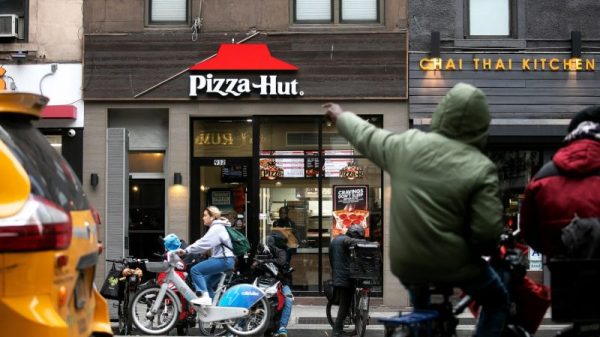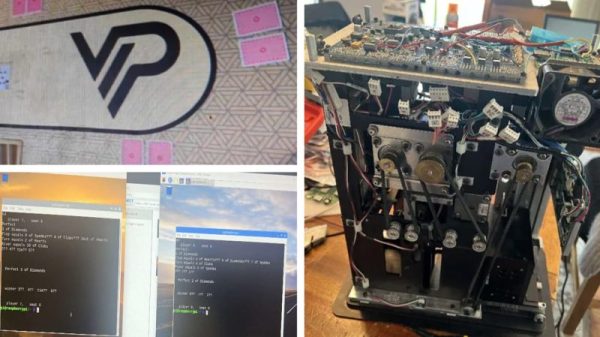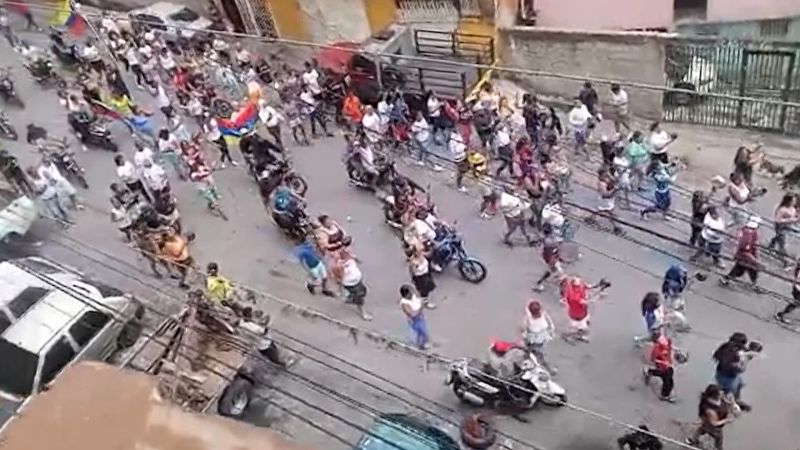Venezuelans across the country took to the streets on Monday to protest a disputed election, clashing with police as uncertainty swirls around the results amid allegations of election fraud.
The election on Sunday was the most consequential one in years, with Venezuela’s future on the line.
Many young opposition supporters said they would leave the country if authoritarian leader Nicolás Maduro was re-elected, pointing to the devastating collapse of the country’s economy and violent repression under his rule. But the opposition was also energized, presenting the ruling establishment its toughest challenge in 25 years.
Though Maduro had promised fair and free elections, the process has been marred with allegations of foul play – with opposition figures arrested, the opposition’s key leader banned from running, media outlets blocked and overseas Venezuelans largely unable to vote.
That’s why, even though Maduro was formally named the winner by the country’s electoral body – which is stacked by the president’s allies – the opposition has rejected the results and other Latin American leaders have refused to recognize his win.
Here’s what you need to know.
Who’s running against who?
Maduro has been in power since the 2013 death of his predecessor Hugo Chávez. If he takes office again, it will be his third consecutive six-year term and the continuation of “Chavismo,” the left-wing populist ideology named after the former leader.
On the other side is a unified opposition movement that overcame their divisions to form a coalition. Its energized campaign stoked hope among a disillusioned populace that was desperate for change, in a country in such dire economic straits that some 8 million Venezuelans have fled overseas.
The opposition candidate, former diplomat Edmundo Gonzalez, stepped into the role after the highly popular leader Maria Corina Machado was barred from running, following allegations she didn’t include some food vouchers on her asset declaration.
But many still see her as a driving force behind the opposition, which had promised to restore Venezuela’s democracy and rebuild its once impressive economy if it won.
Who won?
The results are disputed. Officially, the National Electoral Council (CNE) declared Maduro the winner late Sunday, with 80% of the ballots counted. It said Maduro had won 51.2% of the votes, while Gonzalez received 44.2% of the votes.
The CNE has yet to issue final vote tallies.
But the opposition has rejected the results, claiming their own tallies showed Gonzalez had won. On Monday, they said they had obtained more than 73% of the tally sheets showing more than 6 million votes for Gonzalez and only 2.7 million for Maduro.
Speaking from the capital Caracas, Gonzalez and Machado said all their tallies had been verified and shared online for the public and global leaders to see – something world leaders and opposition figures have called on the CNE to do.
What are the allegations of foul play?
Opposition leaders decried alleged irregularities on Sunday as the votes were being processed and counted.
The opposition said its witnesses were denied access to the National Electoral Council (CNE) headquarters as votes were being counted; their presence was supposed to ensure transparency and fairness.
Only a very limited number of election observers were allowed to monitor the vote. These included The Carter Center, which called on the CNE to publish polling station-level results, saying that information was “critical to our assessment.”
The United Nations was also present, with a spokesperson saying afterward that UN Secretary-General António Guterres called for “complete transparency” and for the electoral body to “undertake their work independently and without interference to guarantee the free expression of the will of the electorate.”
The opposition also alleged that the CNE had halted data being sent from polling stations to the central body, thus preventing more votes from being processed.
The government has also been accused of rigging votes in the past, which it has denied. Maduro’s government controls almost all state institutions, including the CNE, which was accused in 2017 of manipulating turnout figures by a software company that provided the voting technology. The CNE previously denied the assertion.
How are Venezuelans reacting?
Though Maduro supporters celebrated his win in parts of Caracas, Monday was marked by wider protests by the opposition.
In Caracas, hundreds of people marched through the streets, waving Venezuelan flags and chanting, “Liberty!”
Videos from across the country, from Charallave to Caucagüita, show crowds banging their pots — a rattling cacophony so loud it can be heard from far away across an entire city. This Latin American practice is known as cacerolazo – a spontaneous, accessible form of protest also used in Chile and Spain.
“We want peace for Venezuela, for our family members,” a protester, who chose not to be identified, told reporting teams on the ground.
Gonzalez and Machado have called for protests to continue Tuesday.
Maduro decried the protests on Monday saying his government “knows how to confront this situation and defeat those who are violent.”
He also claimed, without providing evidence, that the majority of the protestors were hate-filled criminals and that their plan was hatched in the US.
For Venezuelans this is grimly familiar territory. Previous periods of opposition protests have resulted in harsh crackdowns from by the police and military, who have a long history of protecting the Chavismo system, including in 2017 and 2019.
What is the world saying?
Many regional and world leaders have cast doubt on the results, including the United States – though some of Venezuela’s partners have stood by Maduro.
“We have serious concerns that the result announced does not reflect the will or the votes of the Venezuelan people. It’s critical that every vote be counted fairly and transparently, that election officials immediately share information with the opposition and independent observers without delay,” US Secretary of State Antony Blinken told reporters on Monday.
The foreign ministers and offices of several European nations, including the United Kingdom and Spain, voiced similar concerns.
Other Latin American countries, including Argentina, Chile, Costa Rica, Peru, Panama, the Dominican Republic and Uruguay refused to recognize the results and had their diplomatic staff in country expelled Monday.
The Maduro government accused the nations of being a “group of right-wing Washington-subordinate governments, openly committed to the most sordid fascist ideological positions.”
Late Monday, Venezuela suspended commercial flights to and from Panama and the Dominican Republic, with the transport minister saying the suspension was because it “rejects the interventionist actions of right-wing governments.”
Some of Maduro’s close allies, like China, Cuba, Iran and Russia, were quick to congratulate Maduro.
How did Venezuela get here in the first place?
Once the fifth-largest economy in Latin America, Venezuela has experienced the worst economic collapse of a peacetime country in recent history.
The economic and political crisis brought about by a crash in the price of oil – a key export for Venezuela – combined with chronic corruption and mismanagement at the hands of government officials.
Venezuela is now suffering chronic shortages of vital goods and soaring inflation, while the goods available are too expensive for most people – pushing millions to flee, including thousands who have trekked up north to the US’ southern border.
The US and European Union have imposed punishing sanctions on Maduro’s regime for years, which he has blamed for the crisis, saying Venezuela was victim of an “economic war.”
Last year, Maduro had pledged to hold fair and free elections in exchange for sanctions relief, in US-brokered talks. But after Sunday’s elections, the accusations of fraud now cast doubt on whether Venezuela will be able to return to the international stage.



























